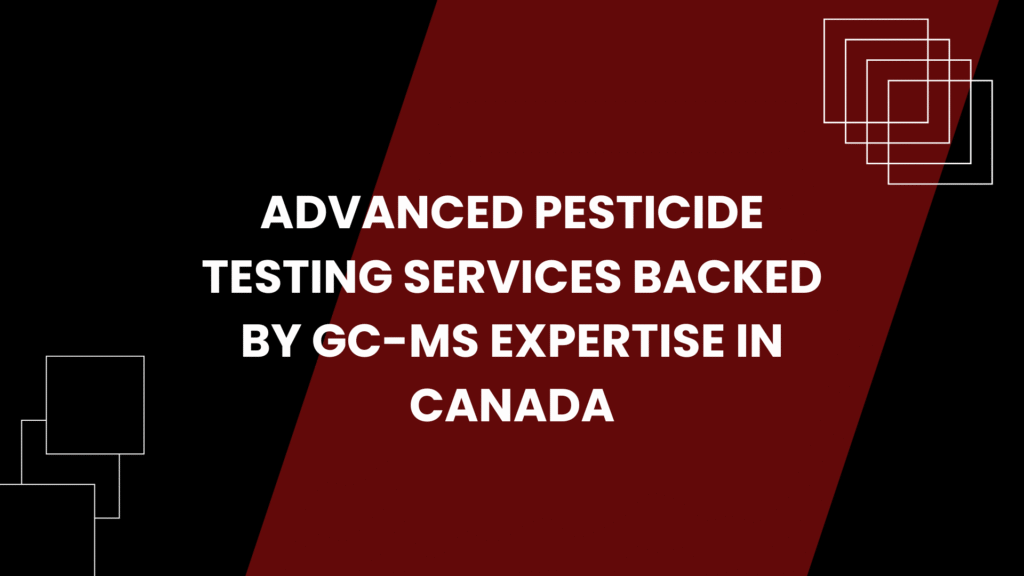.
.
.
Advanced Pesticide Testing Services Backed by GC-MS Expertise in Canada

Quantitative pesticide residue analysis for pharmaceuticals, food, agriculture, and environmental samples.
At ResolveMass Laboratories Inc., we provide reliable pesticide testing services using advanced GC-MS technology. As a trusted name in analytical chemistry in Canada, we focus on detailed chemical analysis and impurity profiling for complex samples—whether it’s food, water, soil, cosmetics, or pharmaceuticals. Our team of Ph.D.-level analytical chemists follows strict FDA-compliant GC-MS procedures to detect even the smallest traces of pesticide residues, helping our clients confidently meet international regulations.
Why Accurate Pesticide Testing Matters
Pesticide residues can cause serious health risks and threaten environmental safety. Whether you work in pharmaceuticals, food production, agriculture, or cosmetics, regulatory agencies like Health Canada, the FDA, and the EU enforce strict limits on pesticide levels. Reliable Pesticide Testing Services help manufacturers ensure their products are safe, avoid costly recalls, and maintain consumer trust.
At ResolveMass, we use highly sensitive gas chromatography-mass spectrometry (GC-MS) methods to detect and measure pesticides at extremely low concentrations—down to ppb and even ppt levels—so your products comply with global standards.
What Sets ResolveMass Apart
✔ GC-MS analysis
✔ FDA-compliant validated methods
✔ Highly experienced PhD chemists
✔ In-house method development for custom matrices
✔ Advanced sample prep for complex food/agriculture samples
✔ Located in Montreal – fast turnaround for Canadian clients
Our Pesticide Testing Services Include
• Quantitative GC-MS/MS pesticide residue testing
• Screening for over 500 pesticides in a single run
• Organophosphates, carbamates, organochlorines, pyrethroids
• Multi-residue pesticide analysis (MRM based)
• Trace-level pesticide testing in cannabis, water, and pharma
• Custom method development for novel analytes
• Impurity profiling of active ingredients
• Support for stability studies and raw material testing
How We Perform GC-MS Pesticide Analysis
At ResolveMass, we use advanced GC-MS and GC-MS/MS systems that offer ultra-trace detection capabilities with powerful library matching. Our methods follow ICH and FDA guidelines for sample preparation, clean-up, and accurate pesticide quantification. Every analysis includes internal standards, calibration curves, and strict quality checks to ensure results are consistent and trustworthy.
Regulatory & Compliance Support
All of our pesticide testing services come with full regulatory documentation for international use. Whether you’re preparing submissions for Health Canada’s PMRA, the U.S. EPA, or EU MRLs, we provide clear, audit-ready reports that include raw data, Certificates of Analysis (CoA), and detailed method descriptions—trusted by top pharma and agri-food companies across North America.
Related Services You May Need
GC-MS Analytical Services
GCMS in Montreal – Fast Turnaround
Residual Solvent Testing
Impurity Profiling for Drug Products
Structure Elucidation Services by NMR
Peptide Mapping vs. RLDs
Conclusion
ResolveMass Laboratories Inc. is your go-to partner for accurate pesticide testing powered by modern GC-MS technology. With a skilled team and deep expertise in analytical chemistry, we help ensure your products are safe, fully compliant, and ready for market. Get in touch with us today to start your pesticide residue testing project.
FAQs
Pesticide testing typically involves extracting residues from the sample matrix (such as food, soil, or water), followed by analysis using advanced instruments like gas chromatography-mass spectrometry (GC-MS). The process includes sample preparation, cleanup to remove interferences, and detection of specific pesticide compounds.
Pesticides can be detected through highly sensitive techniques such as GC-MS and LC-MS/MS, which separate and identify the individual pesticide molecules based on their mass and structure. These methods are capable of detecting pesticide residues at extremely low concentrations—often in ppb or ppt. The use of selective ion monitoring and spectral libraries helps confirm the presence of specific compounds even in complex matrices like food or soil.
The correct way to measure pesticides involves using quantitative analytical methods that follow regulatory guidelines, such as those from the FDA, EPA, or Health Canada. Instruments like GC-MS/MS are used along with calibration standards and quality control samples to ensure measurement accuracy. The entire workflow—from sample extraction to final reporting—must be validated and documented to meet international compliance standards.
GC (Gas Chromatography) analysis of pesticides involves separating volatile pesticide compounds from a sample and identifying them using a detector, often coupled with mass spectrometry (GC-MS). This technique is especially effective for analyzing organochlorines, organophosphates, and pyrethroids. GC-MS provides both qualitative identification and quantitative measurement, making it a gold-standard method in pesticide residue analysis.
The most widely used method for pesticide testing is gas chromatography-mass spectrometry (GC-MS) or liquid chromatography-tandem mass spectrometry (LC-MS/MS), depending on the compound’s volatility and chemical nature. Multi-residue methods (MRMs) are often employed to detect multiple pesticide types in a single analysis. ResolveMass Laboratories uses FDA-compliant, validated methods tailored for each sample matrix to ensure reliable results.
To identify the presence of pesticides, analytical labs typically use techniques like GC-MS or LC-MS/MS, which offer high sensitivity and selectivity. These methods rely on the molecular signature of each pesticide, comparing the sample’s data with known reference standards and spectral libraries. The approach ensures both accurate detection and compound-specific identification, even at very low concentrations.
Pesticide residue analysis commonly uses instruments such as gas chromatography-mass spectrometry (GC-MS), liquid chromatography-mass spectrometry (LC-MS/MS), and high-performance liquid chromatography (HPLC). These tools allow precise identification and quantification of pesticide residues across various sample types. At ResolveMass, we use advanced GC-MS/MS systems equipped with advanced detectors and data processing software for ultra-trace analysis.
Need expert support for your FDA or Health Canada filing? ResolveMass Laboratories Inc. is here to help with expert-level Analytical Method Development in Montreal, Canada and United States (US). Contact our team today via our contact form, or call us directly for consultation. We typically respond within 24 hours.
📍 Location: Montreal, Quebec, Canada
📧 Email: info@resolvemass.ca
🌐 Contact Page: https://resolvemass.ca/contact/